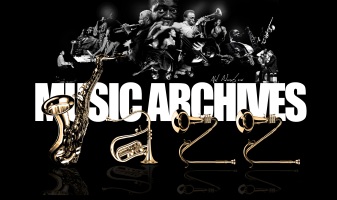
 |
New Latin Jazz Albums Reviews |
Post Reply 
|
| Author | |
snobb 
Forum Admin Group 

Site Admin Joined: 22 Dec 2010 Location: Vilnius Status: Offline Points: 30804 |
 Post Options Post Options
 Thanks(0) Thanks(0)
 Quote Quote  Reply Reply
 Topic: New Latin Jazz Albums Reviews Topic: New Latin Jazz Albums ReviewsPosted: 5 hours 52 minutes ago at 8:08am |
Latin Jazz Album Review: Noteworthy Albums from Alex “Apolo” Ayala, Unity Quartet, and Adam O’FarrillA trio of superb albums run the stylistic gauntlet, from the traditional to the experimental. Alex “Apolo” Ayala’s bass playing first came to my attention last year while listening to David Schumacher & Cubeye’s Smoke In The Sky. I was pleased to find that Ayala had made his own record, Afro Puerto Rican Jazz, on altoist Miguel Zenon’s label, Miel Music. Ayala, who hails from Río Piedras, Puerto Rico, blends jazz, bomba, and plena in interesting and novel ways. In addition to Ayala’s bass, Andrew Gould plays alto and soprano saxophones, Fernando García is on the drums, Victor Pablo García contributes percussion, and Nelson Matthew González takes on the Requinto drum on “Río Piedras,” “Bomba Carambomba,” and “3D Plena.” For his debut album, Ayala has wisely pared down the instrumentation, concentrating on giving his compositions a bold, distinct character. The centerpiece of the record is the “Agonía Suite,” which contains three parts: “Reckoning,” “Hopelessness,” and “Uncertainty.” In his notes, Ayala says that the piece effectively expresses his feelings going through a very difficult time in his life. “Reckoning” starts out in a frenetic manner, led by Gould’s charging alto**.** Gould switches to soprano for the melancholy, slow “Hopelessness.” F. García’s drumming moves “Uncertainty” along at a brisk pace to conclude the “Suite.”. In general, bass players rarely use the bow, but Ayala often breaks the mold, especially on the heartfelt “Ngudi” (Mother). Gould, on soprano, provides a wonderful contrast to the lower register of the bowed bass. The bass and soprano duet on “Bomba Pa’ Ana Luisa” create a soft texture, a fitting sound for a song dedicated to Ayala’s wife. The bow resurfaces on “Sweetness” (also dedicated to his spouse, Anna Louise Andersson), with some light percussion by V.P. García. The last tune here, “Cuembé,” is significant because it draws on a bomba rhythm that is played differently in various parts of the island. Many musicians have not used a piano in their groups. Ornette Coleman and Sonny Rollins immediately come to mind, so this choice is not a new nor original concept. However, Gould hovers in the free jazz world while Ayala is steeped in bomba and plena rhythms — this contrast between new and old — makes for some unusual musical combinations. The sensitive drumming of F. García, coupled with the solid percussion of V. P. García also enhance Ayala’s compositions. Ayala’s uncompromising vision on Afro Puerto Rican Jazz — a debut record! — is a stunning revelation.
The record kicks off in lively form, taking Milton Nascimento’s “Viola Violar” in a new and stimulating direction. “Lucena,” composed by Monteiro, follows, bringing the tempo way down. The third tune reminds me of my second visit to Brazil in 1983 when I was introduced to the music of the composer of “Santo Antonio,” Hermeto Pascoal. Perhaps one of the greatest living composers of instrumental music in Brazil, Pascoal was introduced to United States audiences by Airto Moreira and Flora Purim in the ’70s. Unity Quartet’s excellent version infuses new life into “Santo Antonio.” Luiz Gonzaga, revered composer and master of the sanfona (Accordion), wrote “Pau De Arara,” a jaunty piece. Monteiro states the melody and Alves supplies a great solo turn. The last MPB tune, “Jogral”, taken from the great singer/songwriter Djavan, is a faithful recreation. Kautz composed the title track “Samba Of Sorts.” It is a swinging tune with Lopes playing a bass figure and Kautz rushing in with the drums. The last number, “Paloma Plage,” gives the listener some idea of how Unity Quartet embraces the initial impetus of the samba and molds it into their own tasteful and unique creation. Unity Quartet probes modern Brazilian music in this disc, reinvigorating some classic tunes while at the same time forging their own path with some vibrant new compositions. Samba Of Sorts is a very apt title; the album explores the roots of samba and experiments with the form.
The band is something else: O’Farrill on trumpet and flugelhorn, Mary Halverson, electric guitar, Patricia Brennan, vibraphone, David Leon, alto saxophone and flute, Kevin Sun, tenor saxophone and clarinet, Kalun Leung, trombone and euphonium, Tyrone Allen II, double bass and Thomas Fujiwara, drums. These are not mainstream names, but Halverson, Brennan, and Fujiwara can be found on quite a few ambitious, free jazz recordings — they will become better known in the future. “Swimmers” is a great place to start; O’Farrill charges to the forefront, making some superb statements as Halvorson, Brennan, and Fujiwara back him with aplomb. Leon’s flute intro to “Nocturno 1932” establishes a somber mood that takes the listener back to another time. The following noteworthy composition, “Migration,” flows to and fro, anchored by Allen on double bass and Fujiwara’s supremely tasteful drumming. The ending is abrupt, echoing the horns at the beginning. The ensemble drops out to set a duet between O’Farrill and Halverson on the mesmerizing “Streets”. The most experimental sounds can be heard on “And So On,” Halverson reaching for the outer limits while O’Farrill and Leung compete by reaching for the boundaries of their instruments. There are some quiet, reflective parts of “Late June” and some boisterous cacophony as well. The interplay between Sun on tenor and Leon on alto is particularly compelling. My favorite tunes on For These Streets are its long compositions, each eight or nine minutes. O’Farrill develops his ideas for each over time and the results, from pastoral sequences to raucous sections, never fail to intrigue. The individual gifts of these remarkable musicians come together to make For These Streets one of the most memorable albums so far this year. from https://artsfuse.org |
|
 |
|
Post Reply 
|
|
|
Tweet
|
| Forum Jump | Forum Permissions  You cannot post new topics in this forum You cannot reply to topics in this forum You cannot delete your posts in this forum You cannot edit your posts in this forum You cannot create polls in this forum You cannot vote in polls in this forum |